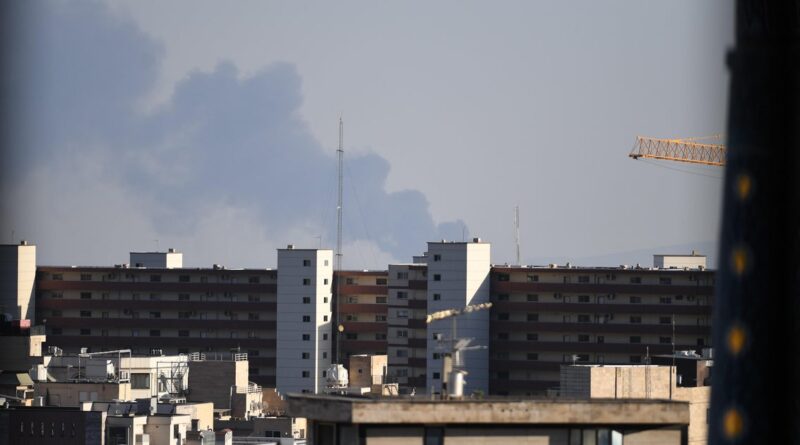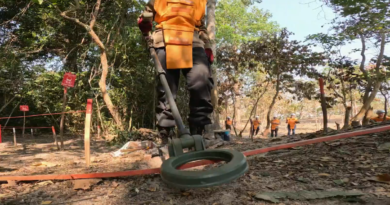Diplomacy’s “last shot” to de-escalate Israel-Iran conflict
Diplomacy will have a “last shot” within the next two weeks to bring the Israel-Iran conflict to an end, according to one American and one European diplomatic official, a window set by President Trump this week as he decides whether to involve the U.S. in Israel’s offensive against Iran.
Those efforts were underway Friday as Iranian Foreign Minister Abbas Araghchi met with European foreign ministers in Geneva in the face of Israel’s ongoing bombing campaign and the U.S. military buildup in the region.
French Foreign Minister Jean-Noël Barrot, UK Foreign Secretary David Lammy, German Foreign Minister Johann Wadephul and the top European Union diplomat, Kaja Kallas, attended the Geneva meeting with Aragchi. Lammy had met with Secretary of State Marco Rubio and Middle East envoy Steve Witkoff at the White House Thursday.
The Geneva meeting lasted nearly four hours — twice as long as scheduled — and afterward, Barrot indicated there would be further talks and told reporters “the problem of Iran’s nuclear program cannot be solved by military means” alone. Lammy said, “We were clear: Iran cannot have a nuclear weapon.”
Araghchi, too, spoke after the meeting and said Iran supported continuing discussions.
“Iran is ready to consider diplomacy once again,” he said, adding, “I stress that Iran’s defense capabilities are not negotiable. (But) I express our readiness to meet again in the near future.”
Supreme Leader of Iran Ali Khamenei remains the ultimate decision-maker, and it’s not yet clear whether the ongoing Israeli airstrikes and impending threat of U.S. involvement will move him any closer toward a diplomatic off ramp than when Witkoff last offered a proposal a few weeks ago. The U.S. offer, which is still on the table, would have allowed Iran to have a civilian nuclear program if it agreed not to enrich uranium on its soil. Instead, Iran would be able to purchase enriched fuel from other countries. One suggestion involved an Omani idea to establish a regional consortium that would allow enrichment for civilian purposes under monitoring by the IAEA and U.S.
Khamenei, 86, is thought to still be battling cancer and is in hiding from the Israeli strikes. He has not responded to overtures from multiple countries seeking to help de-escalate the conflict.
It’s not entirely clear how functional the Iranian government is at this moment. Internet connectivity and international calls into Iran are difficult to complete, according to sources in the region. Cyber attacks have paralyzed the banking system, and as of Thursday, multiple diplomats acknowledged factors like these have made it more difficult to arrange in-person talks with Aragchi.
The ongoing Israeli assault may also make Khamenei fearful about communicating, given concerns about avoiding signals intelligence intercepts that could be used to target him, one diplomatic source suggested.
Anything Aragchi discusses with the West will ultimately need the supreme leader’s approval, and U.S. expectations for a breakthrough during this meeting are low. But it’s a start.
It remains to be seen if the conversation in Geneva produced some indication of whether Iran is still open to direct talks with the U.S. — not just the European nations — which is what Witkoff has also been trying to initiate through his own personal outreach, one U.S. official said.
Turkey and Oman, as well as European countries including Italy and Norway, have offered to host direct or indirect talks between the U.S. and Iran, if Tehran were to choose that path, according to two European diplomatic sources. The Italian foreign minister said Rubio told him Thursday that the U.S. is ready for direct negotiations with Iranian counterparts, and a French diplomat also said Rubio had also conveyed the same message to Barrot. The French foreign minister and secretary of state are expected to speak again after the Geneva consultations.
Mr. Trump has expressed frustration in recent weeks that although Iran has come to the negotiating table, its leaders have shown no willingness to actually negotiate. Iran offered no response for two weeks to Witkoff’s most recent U.S. proposal and neither declined nor accepted its terms, a U.S. official familiar with the efforts told CBS News. Instead, Iranian leaders issued press statements, but negotiators did not directly engage on the specifics or discuss the terms of the offer. That lack of substantive engagement raised doubts from the Trump administration about whether Iran was engaging in good-faith negotiations or simply running out the clock.
Israeli Prime Minister Benjamin Netanyahu has openly questioned whether Iran’s leaders were playing with Mr. Trump and used that uncertainty to justify his unilateral decision to launch military strikes. Multiple U.S. and foreign diplomats indicated that Mr. Trump did not bless the strikes or explicitly tell Netanyahu he should proceed with them. Diplomatic sources acknowledge that Iran’s leaders may also be wondering about the degree of coordination between the U.S. and Israel and may also be uncertain about whether the U.S.-initiated diplomacy was a ruse to justify the use of military force that Netanyahu has long advocated.
But one U.S. official maintained that Mr. Trump’s interest in diplomacy was genuine, as is his aversion to drawing the U.S. military into a Mideast war — especially without a clear sense of what would come next, should the Iranian regime collapse.
U.S. and European diplomats confirmed that there are confidential conversations about who would lead Iran next, whether the nuclear sites and material can be secured, and the potential environmental and health fallout for regional allies from military strikes on nuclear facilities.
In the meantime, the president still has the option of choosing to use military force including the potential of using for the first time in history the MOP or massive ordnance penetrator, a 30,000-pound bunker-buster bomb, to destroy the underground nuclear facilities at Fordo.
In theory, Mr. Trump maintains the ability to launch a strike while he’s out of town at his golf resort in Bedminster, New Jersey, on Friday and Saturday, sources said. A secure suite is set up before he arrives at any out-of-town location, and he also has access to secure communications that would allow him to give an order while en route. While at his Florida golf resort, Mar-a-Lago, he ordered a strike on Syria in 2017, and on an Iranian general in 2020.
In the meantime, the U.S. intelligence assessment remains that Khamenei has not ordered the resumption of the nuclear weapons program that Iran suspended in 2003. But Iran has accumulated a quantity of enriched nuclear fuel that could potentially be matched with an advanced missile or a more rudimentary weapon in short order if the supreme leader ordered it. It remains an open question whether bombing Fordo would trigger Iran’s leaders to sprint toward creating a bomb or end the program altogether.
Elizabeth Palmer and
contributed to this report.





